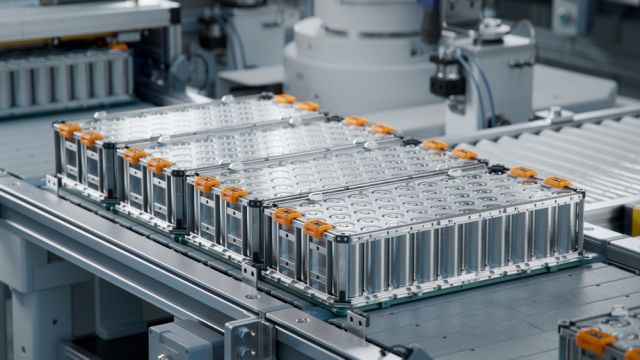
The Biden administration set a goal to have electric vehicles make up half of all new light-duty vehicle sales by 2030. (Source: Shutterstock)
The U.S. Department of Energy (DOE) is making available up to $3.5 billion to bolster domestic production of batteries and battery materials, courtesy of the Bipartisan Infrastructure Law passed in 2021.
The funding availability, announced Nov. 15 by the DOE, comes as the U.S. works to alleviate supply chain constraints for critical materials needed to reach net-zero emissions by 2050. The Biden administration set a goal to have electric vehicles make up half of all new light-duty vehicle sales by 2030.
“Positioning the United States front and center to meet the growing demand for advanced batteries is how we boost our global competitiveness, maintain and create good-paying jobs, and strengthen our clean energy economy” U.S. Secretary of Energy Jennifer M. Granholm said in a news release. “President Biden’s historic investments are giving the boost needed to build a robust domestic battery supply chain that is Made-in-America.”
As part of the funding opportunity, the DOE said it is prioritizing next-generation technologies, battery chemistries and lithium-based technologies. It is also focusing on precursor production and manufacturing for specialized, non-light duty markets and is calling for projects that will increase separation of battery-grade critical materials, expand production facilities for cathode and anode materials production and expand battery component manufacturing facilities, according to the release.
RELATED
Exxon Mobil Aims to Start Lithium Production by 2027
Lyten’s Pilot Plant to Transform Natgas to Lithium-sulfur Batteries
“With the demand for electric vehicles (EVs) and stationary storage alone projected to increase the size of the lithium battery market by five- to ten-fold by the end of the decade, it is essential that the United States invests in the capacity to accelerate the development of a resilient supply chain for high-capacity batteries, including non-lithium batteries,” DOE said in the release.
The U.S. sources most of its batteries and battery materials from other countries, including China—which has tightened its grip on several key ingredients for batteries and computer chips by restricting exports of gallium, germanium and graphite.
Efforts are already underway in the U.S. to boost domestic supplies of batteries and battery materials as investors pour billions into the sector and companies push construction of battery facilities and drilling programs for critical metals.
Recommended Reading
ADNOC Buys 11.7% Stake in NextDecade’s Rio Grande LNG Project
2024-05-20 - The United Arab Emirates’ ADNOC will acquire a 11.7% equity stake in Phase 1 of NextDecade Corp.’s Rio Grande LNG (RGLNG) project from Global Infrastructure Partners (GIP), while also entering an offtake agreement for 1.9 mtpa from the Texas export facility.
What's Affecting Oil Prices This Week? (May 20, 2024)
2024-05-20 - U.S. economic activity, geopolitical uncertainty in the Middle East and the U.S.' recent hike in Chinese EV import duties all have a hand in the sway of oil prices this week.
Bakshani: Midstream Exhibiting M&A Fever Symptoms
2024-05-20 - East Daley Analytics identified several market factors in the midstream sector that point to further consolidation ahead.
Exclusive: Adkins on Challenged Gas Prices, Growing Crude Demand
2024-05-15 - J. Marshall Adkins, head of energy investment banking at Raymond James, details the future of natural gas prices and misconceptions about crude demand coming to an end in this Hart Energy Exclusive interview.
CoolCo, GAIL Enter Long-term LNG Agreement
2024-05-16 - CoolCo and GAIL’s agreement is intended to secure long-term LNG supply in India’s market, with GAIL having an option to extend the 14-year agreement by another two years.





